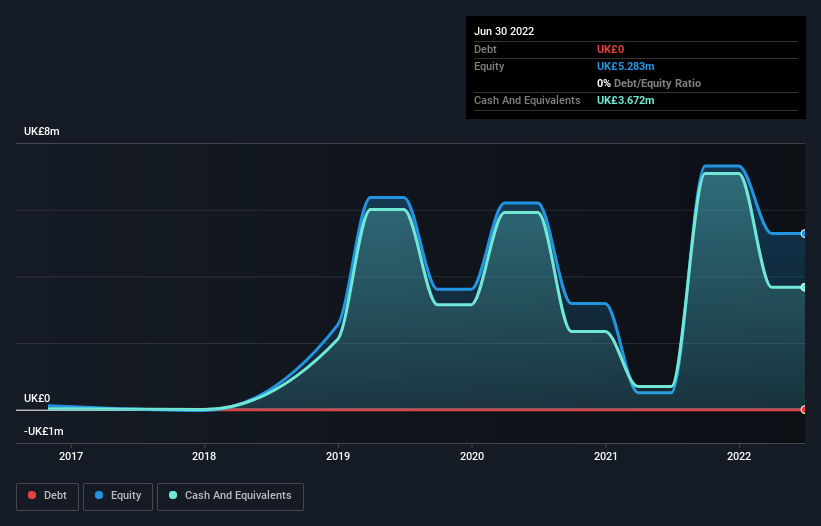- United Kingdom
- /
- Media
- /
- AIM:BIDS
We Think Bidstack Group (LON:BIDS) Needs To Drive Business Growth Carefully

Just because a business does not make any money, does not mean that the stock will go down. For example, although software-as-a-service business Salesforce.com lost money for years while it grew recurring revenue, if you held shares since 2005, you'd have done very well indeed. Having said that, unprofitable companies are risky because they could potentially burn through all their cash and become distressed.
So should Bidstack Group (LON:BIDS) shareholders be worried about its cash burn? For the purposes of this article, cash burn is the annual rate at which an unprofitable company spends cash to fund its growth; its negative free cash flow. We'll start by comparing its cash burn with its cash reserves in order to calculate its cash runway.
Check out our latest analysis for Bidstack Group
When Might Bidstack Group Run Out Of Money?
A cash runway is defined as the length of time it would take a company to run out of money if it kept spending at its current rate of cash burn. As at June 2022, Bidstack Group had cash of UK£3.7m and no debt. Importantly, its cash burn was UK£7.1m over the trailing twelve months. That means it had a cash runway of around 6 months as of June 2022. That's quite a short cash runway, indicating the company must either reduce its annual cash burn or replenish its cash. Importantly, if we extrapolate recent cash burn trends, the cash runway would be noticeably longer. Depicted below, you can see how its cash holdings have changed over time.

How Well Is Bidstack Group Growing?
At first glance it's a bit worrying to see that Bidstack Group actually boosted its cash burn by 36%, year on year. Having said that, it's revenue is up a very solid 72% in the last year, so there's plenty of reason to believe in the growth story. Of course, with spend going up shareholders will want to see fast growth continue. It seems to be growing nicely. While the past is always worth studying, it is the future that matters most of all. So you might want to take a peek at how much the company is expected to grow in the next few years.
How Easily Can Bidstack Group Raise Cash?
Since Bidstack Group has been boosting its cash burn, the market will likely be considering how it can raise more cash if need be. Generally speaking, a listed business can raise new cash through issuing shares or taking on debt. Many companies end up issuing new shares to fund future growth. By looking at a company's cash burn relative to its market capitalisation, we gain insight on how much shareholders would be diluted if the company needed to raise enough cash to cover another year's cash burn.
Bidstack Group's cash burn of UK£7.1m is about 25% of its UK£29m market capitalisation. That's fairly notable cash burn, so if the company had to sell shares to cover the cost of another year's operations, shareholders would suffer some costly dilution.
Is Bidstack Group's Cash Burn A Worry?
On this analysis of Bidstack Group's cash burn, we think its revenue growth was reassuring, while its cash runway has us a bit worried. Looking at the factors mentioned in this short report, we do think that its cash burn is a bit risky, and it does make us slightly nervous about the stock. An in-depth examination of risks revealed 5 warning signs for Bidstack Group that readers should think about before committing capital to this stock.
Of course, you might find a fantastic investment by looking elsewhere. So take a peek at this free list of interesting companies, and this list of stocks growth stocks (according to analyst forecasts)
Valuation is complex, but we're here to simplify it.
Discover if Bidstack Group might be undervalued or overvalued with our detailed analysis, featuring fair value estimates, potential risks, dividends, insider trades, and its financial condition.
Access Free AnalysisHave feedback on this article? Concerned about the content? Get in touch with us directly. Alternatively, email editorial-team (at) simplywallst.com.
This article by Simply Wall St is general in nature. We provide commentary based on historical data and analyst forecasts only using an unbiased methodology and our articles are not intended to be financial advice. It does not constitute a recommendation to buy or sell any stock, and does not take account of your objectives, or your financial situation. We aim to bring you long-term focused analysis driven by fundamental data. Note that our analysis may not factor in the latest price-sensitive company announcements or qualitative material. Simply Wall St has no position in any stocks mentioned.
About AIM:BIDS
Bidstack Group
Bidstack Group Plc, together with its subsidiaries, operates as game advertising and monetization platform in the United Kingdom and internationally.
Adequate balance sheet and slightly overvalued.
Market Insights
Community Narratives



